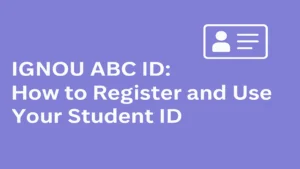Introduction to IGNOU Distance MBA Program
1. What is the IGNOU Distance MBA Program?
The IGNOU Distance MBA program is one of the most popular postgraduate courses offered by the Indira Gandhi National Open University (IGNOU). It is designed to provide flexibility and accessibility to students across the country and even abroad. This program is ideal for working professionals who wish to upgrade their qualifications or individuals seeking to pursue management education without relocating or taking a break from work.
The distance MBA format allows students to study at their own pace, which makes it an excellent option for those with other commitments. The program is structured to cover fundamental management principles, including finance, marketing, human resources, and operations, among other key areas.
2. Importance of Question Papers in Distance MBA Preparation
For any exam, practice is crucial, and IGNOU MBA question papers serve as one of the most effective tools for preparation. These question papers are more than just a reflection of past exams; they help students understand the exam pattern, identify high-weightage topics, and get a real feel for the type of questions that might be asked. By practicing these papers, students can develop a robust strategy for approaching different types of questions, including multiple choice questions (MCQs), case studies, and long-answer questions.
Additionally, solving previous year question papers helps students in:
- Familiarizing themselves with the format of the exam.
- Improving time management during exams.
- Building confidence by practicing real exam scenarios.
Understanding the Structure of IGNOU MBA Exams
1. The Examination System: An Overview
The IGNOU Distance MBA program follows a semester-based examination system, with exams typically held twice a year, in June and December. This gives students ample time to prepare for their exams. The examination structure consists of both theory exams and internal assessments, each contributing to the final grade.
- Theory Exams: These exams typically consist of MCQs, short-answer questions (SAQs), and long-answer questions. The length and complexity of the questions vary depending on the subject.
- Internal Assessments: These include assignments, projects, and practicals, which are submitted periodically throughout the course. Internal assessments carry a weightage that impacts the final result, so neglecting them can hurt your overall performance.
2. Types of Question Papers in IGNOU Distance MBA
Each IGNOU MBA exam paper is designed to test different skill sets of the students. The main types of questions you’ll encounter in these exams are:
- Multiple Choice Questions (MCQs): These questions are relatively straightforward and are typically based on factual knowledge or definitions. They are designed to test your basic understanding of the subject.
- Short-Answer Questions (SAQs): These require concise responses that demonstrate your understanding of key concepts.
- Case Study-Based Questions: Case studies require you to apply theoretical knowledge to real-world business scenarios. They are often the most challenging part of the exam.
- Long-Answer Questions: These questions require detailed, well-structured responses that cover various aspects of a topic. You are expected to provide a comprehensive answer, drawing on multiple theories, concepts, and examples.
3. Grading System and Marking Scheme
The grading system at IGNOU is based on a credit system, where each course is assigned a certain number of credits, typically ranging from 2 to 4. The final grade is calculated using a weighted average, factoring in both your theory exam results and internal assessments.
- For MCQs, each correct answer generally awards one mark, with no negative marking.
- Short-answer questions are generally awarded between 2 to 5 marks, depending on the complexity of the question.
- Long-answer questions can range from 10 to 20 marks, and each answer must demonstrate both depth and clarity.
Accessing IGNOU Question Papers for Distance MBA
1. Where to Find Past Question Papers
One of the first steps to preparing for your IGNOU MBA exams is accessing past question papers. These papers provide valuable insights into the exam format and question types. There are several places where you can find these past papers:
- Official IGNOU Website: The official IGNOU website provides downloadable PDFs of past question papers for various courses, including the MBA program.
- Student Portals and Forums: Many student communities and forums share past question papers. These can be found on educational websites and Facebook groups dedicated to IGNOU students.
- Online Academic Stores: You can also purchase books and guides that contain collections of past IGNOU MBA question papers. These guides often come with solutions and exam strategies.
2. The Benefits of Practicing Previous Year’s Question Papers
Practicing IGNOU MBA question papers offers several benefits:
- Understanding the Exam Format: By practicing past papers, you get a better sense of the types of questions to expect, the format, and the level of difficulty.
- Time Management: Solving past papers helps you practice time management, an essential skill for performing well in the exam.
- Reinforcing Concepts: Revising through question papers allows you to focus on frequently asked topics, helping to reinforce your understanding of key concepts.
- Boosting Confidence: As you become familiar with the exam structure and question types, your exam anxiety decreases, and your confidence increases.
IGNOU MBA Question Paper Format for Different Specializations
1. General Management Papers
The General Management specialization focuses on subjects like organizational behavior, leadership, and strategic management. The typical question paper for this subject may include:
- Multiple-choice questions testing your knowledge of theories like Porter’s Five Forces or SWOT analysis.
- Short-answer questions on the roles and functions of a manager, leadership styles, or organizational structure.
- Case study-based questions that require application of management theories to real-world scenarios.
2. Marketing Management Papers
Marketing Management is one of the most popular specializations, and its question papers often include:
- MCQs on marketing terms, concepts, and case studies (e.g., the 4Ps of Marketing).
- Short-answer questions on topics like market segmentation, positioning strategies, and consumer behavior.
- Case study questions analyzing successful marketing campaigns or brand management.
3. Financial Management Papers
Financial Management focuses on analyzing and managing financial resources within an organization. The question papers for this specialization might include:
- MCQs on financial terms, concepts, and formulas (e.g., NPV, IRR, and capital budgeting).
- Short-answer questions requiring you to explain financial concepts like the cost of capital or risk management.
- Long-answer questions where you might be asked to solve financial problems or analyze financial statements.
4. Human Resource Management Papers
Human Resource Management papers test your knowledge of HR practices, recruitment processes, and employee relations. The structure may include:
- MCQs on HR theories, compensation strategies, and labor laws.
- Short-answer questions on performance management, training, and development.
- Case studies that assess your ability to apply HRM practices in real-world business contexts.
5. Operations and Supply Chain Management
The focus of Operations and Supply Chain Management papers is on production processes, supply chain optimization, and logistics. Expect:
- MCQs on concepts like Lean Manufacturing, Six Sigma, and supply chain strategies.
- Short-answer questions on topics like inventory management, production scheduling, and process improvement.
- Case study-based questions applying theories to optimize operations or solve supply chain problems.
6. IT and Systems Management Papers
This specialization covers the application of information technology in business operations. You may encounter:
- MCQs on IT terms, software solutions, and business analytics.
- Short-answer questions on data security, database management, and enterprise resource planning (ERP).
- Case studies that involve implementing IT solutions to improve business efficiency.
Preparing for IGNOU MBA Exams Using Question Papers
1. How to Use Past Question Papers for Effective Study
Past question papers are a great tool for revising key concepts. Here’s how you can use them effectively:
- Identify Commonly Asked Topics: Look for patterns in past exams. Identify recurring themes and prioritize studying these topics.
- Practice Timed Mock Exams: Simulate real exam conditions by solving the question papers within the allocated time. This helps you improve your time management.
- Revise and Reinforce: After solving the papers, review your answers and ensure that you’ve fully understood the concepts.
2. Time Management: Practicing Under Exam Conditions
A crucial part of your preparation is managing your time efficiently during the exam. Here’s how to improve your timing:
- Create a Time Allocation Plan: Divide the exam time according to the number of questions and their weightage.
- Practice Regularly: Solve question papers under exam-like conditions to get a feel for the time pressure.
- Don’t Get Stuck on One Question: If you’re unsure about a question, move on and come back to it later. This ensures you don’t waste precious time.
3. Building a Study Plan Using Question Papers
Incorporating past question papers into your study plan is vital for systematic preparation. Here’s how to do it:
- Divide the syllabus into sections based on the subjects you’re most and least confident about.
- Dedicate specific days to solving past papers for each subject.
- Track your progress and focus more on topics where you find the most difficulty.
IGNOU MBA Study Material and Its Relationship with Question Papers
1. Official IGNOU Study Material vs. Past Question Papers
The official IGNOU study material is designed to provide in-depth knowledge of the subjects in the MBA program. However, past question papers serve a complementary purpose by helping you understand the exam pattern and test your comprehension.
Here’s how the two resources work together:
- Study Material: It helps you grasp the theoretical concepts, frameworks, and models necessary for answering exam questions. The study material also provides you with detailed explanations, case studies, and examples that you can use in long-answer questions or case study questions.
- Past Question Papers: These help you apply the knowledge gained from study material in an exam setting. They allow you to practice time management, analyze recurring question themes, and develop an efficient answer strategy.
While the study material is extensive, past question papers offer a more exam-centric focus—helping you refine your ability to recognize key areas that might be tested.
2. How to Align Study Material with Exam Patterns
Aligning your study material with the exam pattern is key to targeted preparation. Here’s how you can do it:
- Understand the Question Types: Break down the typical question types (MCQs, SAQs, case studies, long answers). Review the sections in your study material that cover these areas.
- Focus on High-Weightage Topics: Identify the topics that appear most frequently in the past question papers. These are typically your high-yield areas and should be prioritized.
- Summarize Key Concepts: Prepare short notes or flashcards for important concepts, theories, and formulas to ensure easy revision before the exam.
3. External Resources: Supplements to IGNOU Material
While IGNOU’s official study material is comprehensive, sometimes additional resources can deepen your understanding or offer alternate explanations. Consider these options:
- Reference Books: Books authored by well-known management experts can offer different perspectives or real-world applications.
- Online Resources: Websites like Coursera, edX, or LinkedIn Learning provide supplementary courses and videos that can clarify difficult concepts.
- Study Groups and Forums: Engaging in discussion forums or study groups can help clarify doubts, as fellow students often share valuable insights from their own study experiences.
Using external resources will not only help you understand complex topics more easily but will also provide a broader perspective on the subject matter.
Common Mistakes to Avoid When Preparing with IGNOU MBA Question Papers
1. Focusing Too Much on Theory Without Practicing
Many students fall into the trap of overloading themselves with theoretical knowledge from study material but neglect to practice solving question papers. While understanding the theory is crucial, without practice, you might struggle to recall and apply that knowledge during the exam. Here’s why:
- Theory alone isn’t enough: The exam requires you to apply theoretical knowledge to real-world situations.
- Practice helps reinforce theory: The more you solve past papers, the more you’ll understand how to transform theoretical concepts into exam-ready answers.
Tip: Balance theory study with consistent practice of question papers. Set aside time to solve past papers every week to test your retention.
2. Overloading with Question Papers from Too Many Sources
It can be tempting to download as many past papers as possible from various sources. However, this could lead to confusion, especially if the sources are not authentic. You might end up practicing incorrect or outdated papers that don’t align with the current exam format. To avoid this:
- Stick to official sources: Prefer IGNOU’s official website or trusted academic platforms that provide accurate question papers.
- Focus on quality, not quantity: Instead of solving hundreds of papers, focus on thoroughly solving and analyzing a smaller set of well-structured papers.
3. Neglecting the Importance of Internal Assessments
Some students focus only on the theory exams, ignoring the internal assessments, which contribute significantly to your final grade. Assignments, projects, and practicals are a part of the internal evaluation, and their marks are added to the final result. Therefore, ignoring internal assessments is a mistake.
Tip: Complete all assignments on time, and ensure they are well-researched and detailed. Do not ignore practicals or projects, as they can provide a much-needed boost to your overall score.
Understanding the Marking Scheme of IGNOU MBA Exams
1. Detailed Marking Scheme for Different Question Types
In the IGNOU MBA exam, each type of question is awarded marks based on its complexity. Understanding the marking scheme can help you allocate your time and effort more effectively.
- MCQs: These are relatively easy and typically carry 1 mark each. There’s no negative marking, so answer all questions, even if you’re unsure.
- Short-answer questions (SAQs): These questions usually carry 2–5 marks each. Focus on providing concise, but detailed answers, highlighting key concepts and definitions.
- Case studies: These carry more marks, ranging from 10 to 15 marks. These require deeper analysis and application of theoretical knowledge to solve real-life business problems.
- Long-answer questions: These are typically worth 15–20 marks. You must structure your answers in a clear and logical way, addressing all parts of the question thoroughly.
2. Weightage for Each Subject in the MBA Program
The weightage for each subject varies depending on its importance and your specialization. Some core subjects like Strategic Management or Financial Management may carry more weightage than others, and practicing papers from these subjects can be more rewarding.
Tip: Allocate more time to high-weightage subjects while ensuring you don’t neglect minor topics that could also appear on the exam.
3. How to Maximize Your Marks in IGNOU MBA Exams
Here’s how you can make the most of the marking scheme:
- Understand the question: Carefully read each question to ensure that you answer it fully.
- Structure your answers: Use bullet points for short-answer questions, and ensure your long-answer responses have a clear introduction, body, and conclusion.
- Provide examples and case studies: Whenever possible, support your answer with examples or case studies that demonstrate practical knowledge.
IGNOU MBA Internal Assessment and Its Impact on Final Results
1. What Is Internal Assessment in IGNOU MBA?
Internal assessments contribute a significant portion of your final grade in the IGNOU Distance MBA program. These assessments include:
- Assignments: Each subject typically has two assignments that need to be submitted within the semester.
- Projects and Case Studies: Many courses also include project-based evaluations, which require students to apply learned concepts to real-world business scenarios.
2. How to Approach and Submit Internal Assignments
To ace your internal assessments:
- Follow the guidelines carefully: Ensure that your assignments are formatted according to the given guidelines.
- Research thoroughly: Use a variety of sources—books, journal articles, and online resources—to support your arguments.
- Submit on time: Late submissions can result in penalties, so manage your time effectively to meet deadlines.
3. How Internal Assessments Affect the Final Exam Results
While final exams constitute a major part of the grading system, internal assessments carry significant weight in your overall grade. Even if you perform well on the final exam, poor performance in internal assessments can lower your grade. Thus, it’s essential to perform well on both.
IGNOU MBA Exam Schedule and Important Dates
1. Exam Timelines for the Distance MBA Program
The IGNOU MBA exams are typically held in June and December. Students are expected to register for exams in advance, following the official exam schedule issued by IGNOU. The deadlines for assignment submissions, exam registrations, and late fees are usually available on the official IGNOU website.
2. Preparing for Exam Day: What to Expect
On exam day, you’ll need:
- Admit card: Ensure you download and carry your IGNOU admit card.
- Government ID proof: A valid photo ID is required for verification.
- Exam essentials: Bring your stationery, such as pens, pencils, and any necessary documents.
3. Changes in the Exam Schedule: What to Do if It’s Delayed
In case of exam delays (which may happen due to unforeseen circumstances), stay informed by regularly checking IGNOU’s official website. You may need to adjust your study plan and revision schedule to accommodate any changes.
Effective Revision Strategies for IGNOU MBA Exams
1. Revising Key Topics Before the Exam
During your revision phase, focus on:
- High-yield areas: Identify and revise topics that are frequently tested.
- Summarizing key concepts: Create mind maps or flashcards for quick revision.
2. Creating a Final Revision Plan Using Past Papers
In your final revision:
- Solve past question papers in a timed manner to simulate exam conditions.
- Review your answers to spot any gaps in your knowledge.
3. Using Group Study to Enhance Revision
Group study can be an effective way to clear doubts, share insights, and ensure you’re not missing out on important topics. Just ensure the group remains focused and productive.
Additional Resources for IGNOU MBA Students
1. Online Forums and Student Groups
One of the best ways to stay updated and interact with fellow students is by joining online forums and student groups. These platforms can be extremely useful for sharing resources like IGNOU MBA question papers, discussing study strategies, and clarifying doubts. Some of the popular online groups include:
- Facebook Groups: Many dedicated groups exist where students share exam tips, resources, and experiences.
- Reddit: Subreddits related to IGNOU or distance education often have active discussions.
- Telegram Channels: Many Telegram channels share study materials, notes, and solutions to past papers.
These student communities not only help with study resources but also provide peer support, which is essential in staying motivated during long-distance learning.
2. IGNOU’s Learning Support Centers
IGNOU has established Learning Support Centers (LSCs) throughout India to assist students with their academic journey. These centers often provide:
- Personalized tutoring for subjects you may find challenging.
- Workshops and seminars focused on enhancing your academic performance.
- Access to additional study material and online resources.
Although the distance education format can feel isolating, LSCs offer students the opportunity to get face-to-face guidance when needed.
3. IGNOU’s Digital Learning Resources
IGNOU has developed various digital resources to help students access study material, lectures, and tutorials online. These resources include:
- eGyankosh: A digital library that houses lecture notes, books, and study materials for various courses.
- SWAYAM: An initiative by the Government of India to offer free online courses, which can supplement IGNOU’s study material.
- YouTube Channels: IGNOU’s official YouTube channel regularly posts lecture videos and webinars, which can be incredibly useful for students preparing for the exams.
Using these resources helps students stay updated with the latest information, reduces the stress of isolated learning, and broadens their academic perspective.
How to Stay Motivated Throughout the IGNOU MBA Journey
1. Set Clear Goals and Timelines
The IGNOU MBA program is a long-term commitment, often taking two to three years to complete. To stay motivated, it’s essential to:
- Set clear, achievable goals for each semester.
- Break down your goals into smaller, manageable tasks.
- Create a realistic study schedule to avoid procrastination and last-minute cramming.
By having specific goals in mind (e.g., completing assignments, solving past papers, acing a particular subject), you’re less likely to get overwhelmed.
2. Celebrate Small Wins
Every time you complete an assignment, solve a past paper, or achieve a study milestone, take a moment to celebrate your success. Recognizing your progress will keep you motivated and energized. Small rewards like taking a break, enjoying a favorite snack, or watching an episode of your favorite show can help maintain positive momentum.
3. Focus on the Bigger Picture
Remember that the IGNOU MBA is not just about exams and assignments—it’s about acquiring knowledge and skills that will help you grow in your career. Whether you’re aiming for a promotion, a career change, or starting your own business, remind yourself that every study session is a step closer to achieving your long-term professional goals.
Conclusion
In conclusion, preparing for the IGNOU MBA exams requires a structured approach, commitment, and consistent effort. By leveraging the official IGNOU question papers, understanding the exam structure, utilizing supplementary study resources, and focusing on both internal assessments and theory exams, you can maximize your chances of success.
Remember, the journey through an MBA program is not just about the exams; it’s about gaining the knowledge and skills necessary to succeed in the business world. Stay motivated, stay organized, and most importantly, trust in your preparation. Good luck as you prepare for your IGNOU MBA exams!
Common FAQs
Where can I find the latest IGNOU MBA question papers for 2025?
You can access the latest IGNOU MBA question papers for 2025 directly on the official IGNOU website. The university usually uploads question papers from previous years that can help you with your exam preparation. Additionally, student groups, forums, and online academic websites are excellent resources for obtaining these papers.
How many times are the IGNOU MBA exams held each year?
IGNOU MBA exams are held twice a year, typically in June and December. This allows students to plan their studies and schedule accordingly. The exam dates for each semester are announced well in advance on the official IGNOU website.
Can I get a copy of the answer sheet for my IGNOU MBA exam?
Unfortunately, IGNOU does not provide students with a copy of their exam answer sheets. However, you can view your grades and results after the exam on the official IGNOU student portal. It’s a good idea to review your answers in the exam before submitting, as there’s no way to retrieve or re-check them afterward.
Are there any special tips for solving case studies in the IGNOU MBA exams?
Yes, solving case studies in IGNOU MBA exams requires a structured approach:
Start by understanding the problem: Identify the key issue or challenge in the case.
Apply relevant theories and concepts from your study material.
Offer practical solutions based on your analysis of the case.
Ensure your answer is well-organized, with a clear introduction, analysis, and conclusion.
Practice is essential—by solving as many past case studies as possible, you’ll gain confidence and improve your problem-solving skills.
What are the best study materials for IGNOU MBA exams?
The official IGNOU study material is comprehensive, but it can be supplemented with books from well-known authors, online courses, and reference materials. Some useful books for IGNOU MBA preparation include:
“Strategic Management” by Fred R. David (for strategic management)
“Marketing Management” by Philip Kotler (for marketing papers)
“Financial Management” by I.M. Pandey (for finance papers)
These external books, combined with IGNOU’s study material, will offer you a well-rounded preparation strategy.
Related Posts:
- IGNOU Question Papers for B.Ed Exams 2025: Best Preparation Tips and Strategies
- IGNOU Question Paper Format for June/December 2025 Sessions: The Best Guide
- IGNOU Exam Pattern for MA in English: A Comprehensive Guide 2025
- Improve IGNOU Exam Result in 2025: Best Strategies, Tips & Tricks
- IGNOU Admit Card and Hall Ticket: What’s the Difference 2025




